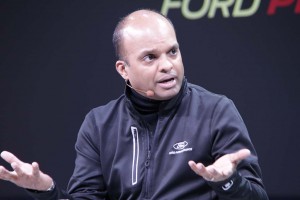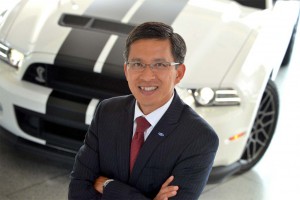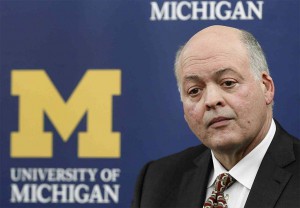
Raj Nair will shift from running product development to serve as head of Ford's North American operations.
Just days after Ford Motor Co. announced a new chief executive officer, incoming CEO Jim Hackett has revealed a sweeping realignment of his top management team, shuffling over a dozen senior executives into new position, ousting others, and even rehiring one Ford veteran who had quit to take a job heading Uber’s autonomous vehicles program.
Separately, Ford said that Hackett, the former head of furniture maker Steelcase, is now eligible for at least $13.4 million in compensation this year. That includes $1.8 million in salary, $7 million in stock-based compensation and various bonuses.
“The leadership changes we are announcing today across our global business are important as we foster even greater teamwork, accountability and nimble decision-making,” the 62-year-old Hackett said in a statement released Thursday.
(Ford CEO Fields out, Hackett in. Click Here for the initial story.)
The management shake-up touches virtually every major aspect of Ford operations, and follows several other critical appointments announced on Monday, the same day the automaker said Hackett would replace Mark Fields as chief executive. That earlier realignment saw Jim Farley promoted from head of Ford’s European operations to its new chief of global markets. And President of the Americas Joe Hinrichs was boosted to president of global operations.
Today’s announcement of even more management moves comes as no surprise in light of the broader effort to put Ford on track and reverse recent declines in its sales, earnings and stock price.
“We have to empower the teams and we have to move fast,” Ford CEO Bill Ford Jr. said during a Monday news conference, “and we have to trust our people to move fast.
Among the newest moves:
- Raj Nair, currently head of global product development and technology will become head of North American operations;
- Hau Thai-Tang, who had been overseeing global purchasing, will retain that role but add global product development duties;
- Steven Armstrong, chief operating officer in Europe, will take on the CEO role there, while also overseeing the Middle East and Africa;
- Sherif Marakby, who Ford veteran who left to run Uber’s global vehicle programs, will return and take over the Detroit automaker’s electric and self-driving vehicles program.
For Marakby, the offer to return to Ford might be a case of good timing. He spent a year at Uber, but the ride-sharing giant has been embroiled in turmoil in recent months. It has been rocked by a sexual discrimination scandal and, among other things, it is battling Google over claims that a top Uber executive stole autonomous vehicle secrets when he left the tech giant’s own self-driving subsidiary Waymo.
(Who is new CEO Jim Hackett? Click Here to learn more.)
Ford will need strong leadership in both its electric and autonomous vehicle programs, industry analysts emphasize. While an early proponent of battery technology, the carmaker’s current models aren’t selling well and it has fallen behind competitors like Nissan, General Motors and Tesla in getting affordable, long-range models to market.
On the other hand, Ford recently was cited by Navigant Research as having the industry’s most advanced self-driving vehicle program, ahead of Waymo. The Detroit carmaker has promised to bring a fully driverless vehicle to market by 2021.
Ford has also been faulted for not moving more quickly in other vehicle segments – in particular, it needs to update or replace slow-selling passenger cars like the Focus sedan, while also expanding its line-up of SUVs and pickups to take advantage of the current boom in demand for light trucks.
The management shuffle announced Thursday morning also includes the departure of at least one top executive, Dave Schoch, a 40-year Ford veteran now running Ford’s Asia Pacific operations, will retire. He will be replaced by Peter Fleet, who had been handling marketing efforts in the region.
Industry analysts have suggested that even more management changes will come at lower levels. The challenge will be to ensure that the automaker isn’t overtaken by turmoil that could counter Chairman Bill Ford’s desire to “move fast” to fix the problems that led to the ouster of CEO Fields.
(To see more about how Detroit’s Big Three are adapting to a fast-changing global auto market, Click Here.)


